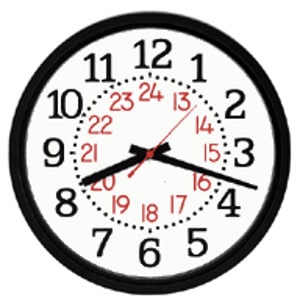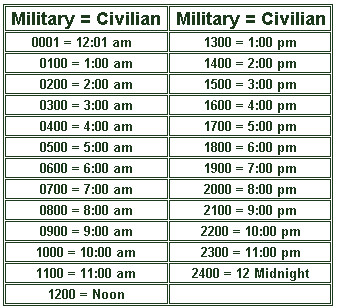
Having not served in the Armed Forces, I was always thrown for a loop whenever someone would randomly bust out military time. I didn’t have problems with morning times — those are easy to figure out. 0800. Yeah, I got it. 8:00am.
It was when someone gave me a time that was in the afternoon or evening that I had trouble. I knew I had to add or subtract 12 to convert military time to standard time, I just never knew which one was the correct option in that moment. Consequently, I would stand there in silence, furrowing my eyebrows, trying to make the conversion as quickly as I could so I didn’t look like an idiot.
I always looked like an idiot.
Tired of feeling like a civilian chucklehead, I decided once and for all to learn how to convert military time to standard time quickly and easily. Here’s how to do it.
Understanding the 12-Hour and 24-Hour Time Systems

There are two main systems for telling time: the 12-hour and the 24-hour. In North America, civilians use the 12-hour clock in which the day is divided into two sections: the 12 hours from midnight to noon (ante meridiem — a.m.), and the 12 hours from noon to midnight (post meridiem — p.m.). Under the 24-hour clock system, the hours of the day run 0-23, midnight to midnight. Midnight is 00:00 and the last minute of the day is 23:59. Midnight is also sometimes rendered as 24:00 to indicate the end of the day. So for example, you would say that Thursday ends at 24:00 tonight, and Friday begins at 00:00.
When you compare the two systems, the 12-hour clock has its disadvantages. It can cause confusion over whether a time given is in the am or pm, and whether 12:00 is midnight or noon. It’s also easier to calculate the duration of something using the 24-hour clock. For example, you can more quickly figure out that something lasts for five hours if you know it runs from 10:30 to 15:30, rather than being told that it ran from 10:30am to 3:30pm. For these reasons, the 24-hour clock is popular around the world, and was adopted first by the US Navy in 1920, and then by the Army in 1942, during WWII.
While the 24-hour clock is the international standard for time-telling, because of the rarity of its use in North America outside of the Armed Forces (and some areas of medical and emergency services, navigation, aviation, and computing where ambiguities in the time can be dangerous and cumbersome), it is commonly known here as “military time.” “Military time” has some differences from the standard use of the 24-hour clock, as detailed below.
How to Convert Military Time to Civilian Time

Converting military time to civilian time (or vice versa) is pretty easy once you get the hang of it:
- The hours from 1am to noon are the same as in civilian time-keeping. For hours below 10, you just add a zero in front of it. So 9:00am becomes 0900.
- For a military time that’s 1300 or larger, simply subtract 1200 to get the standard time. So for example if someone says “Meet me in room 202 at 1545,” you’d just subtract 1200 from 1545 to get 3:45pm. Simple right?
- If you want to convert standard time to military time, add 1200 to any time from 1:00pm to 11:00pm. So if you want to say 6:30pm in military lingo, add 1200 to 6:30 to get 1830.
Is midnight 2400 or 0000? Midnight is sort like an ace card. It can be high or low. You’ll hear midnight referred to as 2400 or 0000.
Writing and Speaking Military Time
Writing military time. Unlike standard use of the 12-hour and 24-hour clocks, you don’t place a colon between the hour and the minutes when writing military time.
Speaking military time. When you say the numbers, always use “hundred” instead of “thousand.” So 0600 would be spoken “zero six hundred” or “zero six hundred hours” (more on this below). And 1000 would be spoken as “ten hundred” not “one thousand.” To say a time with minutes, you simply pronounce each number. For example:
- 0001 (12:01am): “zero zero zero one”
- 0215 (2:15am): “zero two fifteen”
- 1545 (3:45pm): “fifteen forty-five”
While saying “oh” for “zero” (“Be there at ‘oh six hundred!'”) is colloquial and often seen in movies and TV, saying “zero” is a part of military communication protocol.
As far as whether you should say “hours” after giving the time, that somewhat varies by what branch of the military you’re dealing with. If Soldiers and Airmen are saying 2:00pm, they’re a little more likely to give it to you as “fourteen hundred hours,” while Marines or Coast Guardsman are a little more likely to render it just “fourteen hundred.” Across the branches though, it’s typical to drop the “hours†bit when you’re talking face-to-face and your meaning is obvious, only adding it in conversation and written communication that’s more formal and where you want to make sure the message is clear.
What the heck does “Zulu†mean? You’ve probably seen movies where combat pilots or officers in the command center say the military time and then add “Zulu†or “Z†at the end as in “The mission will begin at 1500 Zulu.â€
Because military personnel can be involved in missions that cross time zones, they need a common time zone reference, so they know they’re talking about the same thing. “Zulu†or “Z†indicates that the time zone being referenced is Greenwich Mean Time (Coordinated Universal Time), the time zone that regulates the world’s clocks.
There are other time zones that the military references, but Zulu is the most common.
You’ll likely never have to reference Zulu time as a civilian, but it’s something cool to know when you’re reading Tom Clancy novels.
Alright, soldier. It’s 2300 hours here in Oklahoma and it’s time to turn in and begin the day tomorrow at 0630. Lesson over. Now go forth and never be flummoxed by military time again.
Do you use “military time” even though you’re not in the military? Or do you just stick with the civilian 12-hour clock? Share with us in the comments.


